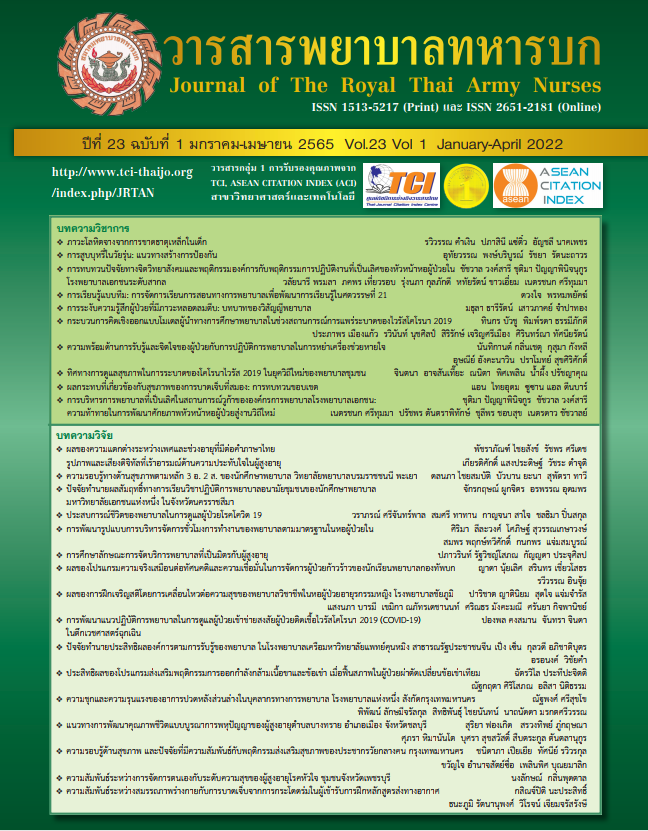The Effects of Virtual Reality Learning Program on Attitudes and Confidence in Managing Patient Aggression of The Royal Thai Army Nursing Students
Keywords:
virtual reality program, managing patient aggression, attitude towards managing patient aggression, confidence in managing patient aggressionAbstract
This study is a quasi-experimental design with a posttest-only design with nonequivalent groups that aims to study the effects of a virtual reality learning program on attitudes and confidence in managing patient aggression of the Royal Thai Army nursing students. The virtual reality program simulates a learning situation regarding aggressive patient management. The samples were nursing students of the Royal Thai Army Nursing College. The research instrument used for conducting data included attitude and confidence measurements towards managing patient aggression. The data was analyzed using percentages, means, standard deviation, and independent t-test. The results displayed that the attitude’s mean score in managing patient aggression amongst the group who received the virtual reality program was moderate level ( = 3.67, SD = 0.39) and the mean score of the general learning group was moderate level (
= 3.02, SD = 0.24).The comparison between groups pointed out that the students using the virtual reality learning program obtained a higher attitude score than the general learning group, with statistical significance at level .05. The mean score of confidence in the virtual reality program group was uncertain level (
= 3.63, SD = 0.62) and the mean score of the general learning group was uncertain level (
= 3.16, SD = 0.36). The comparison between groups pointed out that the students using the virtual reality learning program obtained a higher confidence score than the general learning group, with statistical significance at level .05. This study indicated that the virtual reality learning program for managing patient aggression can effectively enhance the students’ attitudes and confidence in aggressive patient management.
Downloads
References
Anderson A, West SG. Violence against mental health professionals: when the treater becomes the victim. Innov Clin Neurosci. 2011; 8:34-9.
Drach Zahavy A, Goldblatt H, Granot M, Hirschmann S, Kostinski H. Control: patients’ aggression in psychiatric settings. Qual Health Res. 2012; 22:43–53.
Department of Mental Health. ANNUAL REPORT 2019. 2019. Bangkok : La-Mom Company Limited. (in thai).
Klinpiboon K., et al. Development of a management model for violent aggressive behavior in psychiatric patients for nursing in general hospitals and community hospitals. Journal of Mental Health of Thailand. 2018; 26(3): 207-219. (in thai).
Maniwong C., Phanthu K. Experience in practice and adjustment of students Nurses from the southern border provinces Boromarajonani College of Nursing, Suphanburi. Journal of Nursing and Education. 2013; 6(3): September - December. (in thai).
Chaemchaeng S., Atthamethakul W., Pitaksin D. The effect of preparation for training Practicing nursing on wards in a structured manner For Bachelor of Nursing students, 2nd year, Boromarajonani College of Nursing, Ratchaburi. Journal of Science and Technology, Ubon Ratchathani University. 2018; 20(3): September- December. (in thai).
Siripattana kulkajorn S. The 21st Century Learning. The NAS Magazine King Mongkut’s University of Technology Thonburi. 2013; 2: 18-20. (in thai).
Panich W. Way of learning for students in the 21st century. Bangkok: Sodsrisaritwong Foundation; 2012. (in thai).
Injui R., Chiewsothorn S., Nuilers Y. Development of Virtual Reality Program in Managing Aggressive Patients. Journal of The Royal Thai Army Nurses. 2021. 22(1) : 110-117. (in thai).
Duxbury J, Hahn S, Needham I, Pulsford D. The Management of Aggression and Violence Attitude Scale (MAVAS) : a cross-national comparative study. J Adv Nurse. 2008 ; 62: 596–606.
Thackrey M. Clinician confidence in coping with patient aggression: assessment and enhancement. Professional Psychology: Research and Practice. 1987;18:57-60.
Brown, A. M. Simulation in undergraduate mental health nursing education: A literature review. Clinical Simulation in Nursing. 2015. 11(10), 445-449
Wan, W., & Lam, A. The effectiveness of virtual reality-based simulation in health professions education relating to mental illness. A literature review. Health, 2019. 11, 646-660.
Jack Pottle. EDUCATION AND TRAINING Virtual reality and the transformation of medical education. Future Healthcare Journal 2019, 2019. Vol 6, No 3: 181–5
Lori K., Samantha K., and Karyn M., Effectiveness of a Second Life® Simulation as a Teaching Strategy for Undergraduate Mental Health Nursing Students. Journal of Psychosocial Nursing and Mental Health Service, 2012. 50(7) :28-37.
Doolen J, Giddings M, Johnson M, Guizado N, Gigi B, Lysander O. ‘An evaluation of mental health simulation with standardized patients’, International Journal of Nursing Education Scholarship, 2014. no. 11 : 55–62.
Pamela C., Smith DN. Bernita K., and Hamilton P. The Effects of Virtual Reality Simulation as a Teaching Strategy for Skills Preparation in Nursing Students. Clinical Simulation in Nursing, January. 2015. 11(1): 52-58.
William A., Vidal Victoria L., and John P. Traditional Instruction versus Virtual Reality Simulation: A Comparative Study of Phlebotomy Training among Nursing Students in Kuwait. Journal of Education and Practice. 2016. 7(9) :18-25.
Downloads
Published
How to Cite
Issue
Section
License
Copyright (c) 2022 Journal of The Royal Thai Army Nurses

This work is licensed under a Creative Commons Attribution-NonCommercial-NoDerivatives 4.0 International License.
บทความหรือข้อคิดเห็นใดใดที่ปรากฏในวารสารพยาบาลทหารบกเป็นวรรณกรรมของผู้เขียน ซึ่งบรรณาธิการหรือสมาคมพยาบาลทหารบก ไม่จำเป็นต้องเห็นด้วย
บทความที่ได้รับการตีพิมพ์เป็นลิขสิทธิ์ของวารสารพยาบาลทหารบก
The ideas and opinions expressed in the Journal of The Royal Thai Army Nurses are those of the authors and not necessarily those
of the editor or Royal Thai Army Nurses Association.






